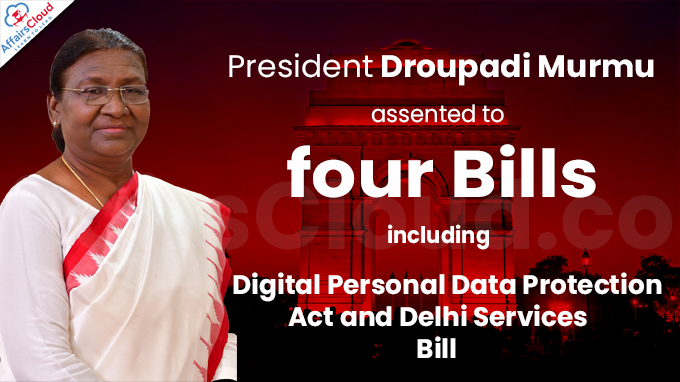 On 12th August 2023, the President of India Droupadi Murmu gave assent to four bills including the Digital Personal Data Protection Bill 2023, the Registration of Births and Deaths (Amendment) Bill 2023, the Jan Vishwas (Amendment of Provisions) Bill 2023, and the Government of National Capital Territory of Delhi (Amendment) Bill 2023.
On 12th August 2023, the President of India Droupadi Murmu gave assent to four bills including the Digital Personal Data Protection Bill 2023, the Registration of Births and Deaths (Amendment) Bill 2023, the Jan Vishwas (Amendment of Provisions) Bill 2023, and the Government of National Capital Territory of Delhi (Amendment) Bill 2023.
- As per the Indian constitution, a bill transforms into an act upon receiving the President’s assent and is then formally announced in the official gazette. Consequently, the aforementioned bills have now been enacted as acts.
The Registration of Births and Deaths (Amendment) Bill 2023:
i.The Registration of Births and Deaths (Amendment) Bill 2023 amends the Registration of Births and Deaths 1969 Act.
- The Registration of Births and Deaths (Amendment) Bill 2023 falls under the jurisdiction of the Ministry of Home Affairs.
ii.The bill will contribute to the development of a national and state-level database of registered births and deaths, which will eventually ensure the efficient and transparent delivery of public services and social benefits, as well as digital registration.
key Features of the Bill
i.Database of births and deaths: The Bill provides for the appointment of a Registrar-General of India(Central level), who may issue general directions for registration of births and deaths, and also maintain a national database of registered births and deaths.
- The Chief Registrars (appointed by states) and Registrars (appointed by states for local area jurisdiction) , who are appointed by the states for local area jurisdiction, will be liable for providing data on registered births and deaths to the national database.
- Note – The Registrar General of India(RGI) is a designated office that operates within the framework of the Ministry of Home Affairs.
ii.Electronic certificates:The Bill facilitates the insertion of provisions for digital registration and electronic delivery of certificates of births and deaths.
iii.Aadhaar details of parents and informants required: The original act allowed certain persons to report births and deaths to the Registrar. Ex-the medical officer in charge of a hospital where a baby is born must report the birth.
- The amendments expand the list of specified persons including the adoptive parents for non-institutional adoption, biological parents for births through surrogacy, and the parent in case of birth of a child to a single parent or unwed mother.
- The amendments added that the specified persons shall also provide the Aadhaar number of the parents and the informant.
iv.Use of birth certificate: It will provide for the use of the birth certificate as a single document to prove the date and place of birth of a person born on or after the date of commencement of the Registration of Births and Deaths (Amendment) Act, 2023.
- The information will be used for purposes including for admission to an educational institution, issuance of a driving license, preparation of voter list, marriage registration, appointment to a post in central or state government or a local body or public sector undertaking or in any statutory or autonomous body under the central or state government.
v.Appeal process: Everyone who is dissatisfied with the Registrar’s or District Registrar’s decision or order may file an appeal with the District Registrar or Chief Registrar, as appropriate.
- Such an appeal must be filed within 30 days of receiving the action or order in dispute.
- The decision of the District Registrar or Chief Registrar must be made within 90 days of the date of the appeal.
vi.Connecting database:The Bill states that the national database may be made available to other authorities preparing or maintaining other databases and the use of the national database must be approved by the central government.
- Both the States and Union Territories are responsible for maintaining separate databases within the Civil Registration System(CRS). This system operates under the operational oversight of the Registrar General of India (RGI).
- It includes the population register, electoral rolls, ration cards, and any other national databases as notified by the Government.
- Also, the state database may be made available to authorities dealing with other state databases, subject to state government approval.
The Government of National Capital Territory of Delhi (Amendment) Bill, 2023
The purpose of this Act is to make changes to the “Government of National Capital Territory of Delhi Act, 1991. This Act was passed on August 11, 2023.The name of this Act is the “Government of National Capital Territory of Delhi (Amendment) Act, 2023.”
- Hence, the “Government of National Capital Territory of Delhi (Amendment) Bill, 2023” replaces the “Government of National Capital Territory of Delhi (Amendment) Ordinance, 2023.”
- The Government of National Capital Territory of Delhi (Amendment) Bill, 2023 falls under the jurisdiction of the Ministry of Law and Justice.
Note – This is a common practice where an ordinance (temporary law issued by the executive branch) is replaced by a bill passed by the legislative body (in this case, the Parliament), which then becomes a permanent law.
Highlights of the Bill:
i.Establishment of National Capital Civil Services Authority(NCCSA):
The Bill establishes the National Capital Civil Services Authority(NCCSA) to recommend various service-related issues to the Lieutenant Governor of Delhi (LG).
- It includes transfers and postings, matters related to vigilance, disciplinary proceedings, and prosecution sanctions of Group A of All India Services (except Indian Police Service), and The Delhi, Andaman & Nicobar, Lakshadweep, Daman and Diu and Dadra and. Nagar Haveli (Civil) Services(DANICS).
- The Authority consists of the Chief Minister of Delhi as Chairperson, the Principal Home Secretary of the Delhi government as Member Secretary, and the Chief Secretary of the Delhi government as member.
- The central government appoints both the Principal Home Secretary and Chief Secretary.
- All Authority decisions shall be made by a majority vote of the members present and voting. A meeting requires a quorum of two individuals.
ii.Powers of the Lieutenant Governor:Lieutenant Governor of Delhi granted discretionary power over matters beyond Delhi Assembly’s competence or requiring Judicial/quasi-judicial action.
- It also increases the LG’s discretionary role by granting him the authority to approve or reject the Authority’s recommendations.
- In the event of a disagreement between the LG and the Authority, the LG’s judgment will be final.
iii.Disposal of matters by Ministers: A Minister of the Delhi government prior to issuing any order regarding certain topics, the order must be submitted to the LG for his opinion through the Chief Minister and the Chief Secretary.
- It includes the peace and tranquility of Delhi, relations between the Delhi government and the central government, Supreme Court, or other state governments, summoning, prorogation, and dissolution of the Legislative Assembly, and matters on which LG is to give an order in his sole discretion.
iv.Duties of Secretaries:The Department Secretaries must bring certain matters to the notice of the LG, the Chief Minister, and the Chief Secretary.
- It includes matters which may bring the Delhi Government into controversy with the central or any state government, the Supreme Court, or the High Court of Delhi.
The Digital Personal Data Protection Bill, 2023
The primary purpose of the Bill is to regulate the processing of digital personal data and respect individuals’ right to protect their data while recognizing the necessity of processing and using such data for lawful purposes.
- The Digital Personal Data Protection Bill, 2023 falls under the jurisdiction of the Ministry of Electronics and Information Technology.
Key Features:
i.Applicability: The Bill applies to the processing of digital personal data within India where such data is collected online, or collected offline and is digitised.
- It will also apply to the processing of personal data outside India if it is for offering goods or services in India.
- Personal data is defined as any data about an individual who is identifiable by or in relation to such data
ii.Consent:Personal data may be processed only for a lawful purpose after obtaining the consent of the individual.
- Consent will not be required for ‘legitimate uses’ including specified purposes for which data has been provided by an individual voluntarily, provision of benefit or service by the government, medical emergency, and employment.
iii.Rights and duties of data principal: An individual whose data is being processed (data principal), will have the right to obtain information about processing, seek correction and erasure of personal data, nominate another person to exercise rights in the event of death or incapacity, and grievance redressal.
iv.Obligations of data fiduciaries: The entity determining the purpose and means of processing, (data fiduciary), must make reasonable efforts to ensure the accuracy and completeness of data, build reasonable security safeguards to prevent a data breach, inform the Data Protection Board of India and affected persons in the event of a breach, and erase personal data as soon as the purpose has been met and retention is not necessary for legal purposes (storage limitation).
v.Data Protection Board of India: The central government will establish the Data Protection Board of India.
- Key functions of the Board include monitoring compliance and imposing penalties, directing data fiduciaries to take necessary measures in the event of a data breach, and hearing grievances made by affected persons.
vi.Penalties: Bill specifies penalties for various offenses such as up to Rs 200 crore for non-fulfillment of obligations for children, and Rs 250 crore for failure to take security measures to prevent data breaches.
- Penalties will be imposed by the Board after conducting an inquiry.
vii.Transfer of personal data outside India: The Bill allows the transfer of personal data outside India, except to countries restricted by the central government through notification.
viii.Exemptions: Rights of the data principal and obligations of data fiduciaries (except data security) will not apply in specified cases including prevention and investigation of offences, and enforcement of legal rights or claims.
- By notification, the central government exempts certain activities from the application of the Bill including processing by government entities in the interest of the security of the state and public order, and research, archiving, or statistical purposes.
The Jan Vishwas (Amendment of Provisions) Bill, 2023
The Jan Vishwas (Amendment of Provisions) Bill, 2023 falls under the jurisdiction of the Ministry of Commerce and Industry.
- Through The Jan Vishwas (Amendment of Provisions) Bill, 2023, a total of 183 provisions are being proposed to be decriminalized in 42 Central Acts administered by 19 Ministries/Departments.
- Acts being amended include the Indian Post Office Act, of 1898, the Environment (Protection) Act, of 1986, the Public Liability Insurance Act, 1991, and the Information Technology Act, of 2000.
- The Bill was referred to a Joint Parliamentary Committee (Chair: Mr. P.P. Chaudhary), which submitted its report on March 17, 2023.
Click here to know more about the Jan Vishwas Bill
Recent Related News:
i.President Droupadi Murmu has given her assent to the Competition(Amendment Bill),2023, which aims to amend the Competition Act, 2002, that regulates competition in the Indian market and forbids anti-competitive practices like cartels, mergers, and acquisitions that might have a negative impact on competition.
ii.On April 10, 2023, the Governor of Tamil Nadu (TN) Ravindra Narayana (RN) Ravi approved the ‘Tamil Nadu Prohibition of Online Gaming and Regulation of Online Games Bill, 2022’ to ban online gambling, including online rummy and poker with stakes.
About the National Capital Territory(NCT) of Delhi:
Chief Minister – Arvind Kejriwal
Governor – Vinai Kumar Saxena
Wildlife Sanctuary – Asola Bhatti Wildlife Sanctuary
Festivals – Bhai Dooj Festival, Chhat Festival




